#vocabulary learning
Explore tagged Tumblr posts
Text

🎓 Learn Chinese Online | Learn Mandarin | Chinese Vocabularies
#learn chinese#mandarin#belajar bahasa mandarin#belajar bahasa mandarin pemula#belajar mandarin#chinese language#tumblr#education#language learning#learn chinese online#vocabulary learning#vocabulary#makeup
11 notes
·
View notes
Text
Vocabulary Learning and Video Games | PsychoLingo Podcast
🎙️🎮 Excited to be a guest on the PsychoLingo podcast, discussing how video games can enhance second language vocabulary learning! Tune in now! #PsychoLingo #Podcast
This week, I had the pleasure of being a guest on the PsychoLingo podcast, where we explored how video games can enhance vocabulary learning in second language education. In this episode, we examine two studies examining how video games can be used to learn vocabulary in second language learning. Asari, S. (2023). Vocabulary development of EFL young learners after long peer interaction with…

View On WordPress
1 note
·
View note
Text
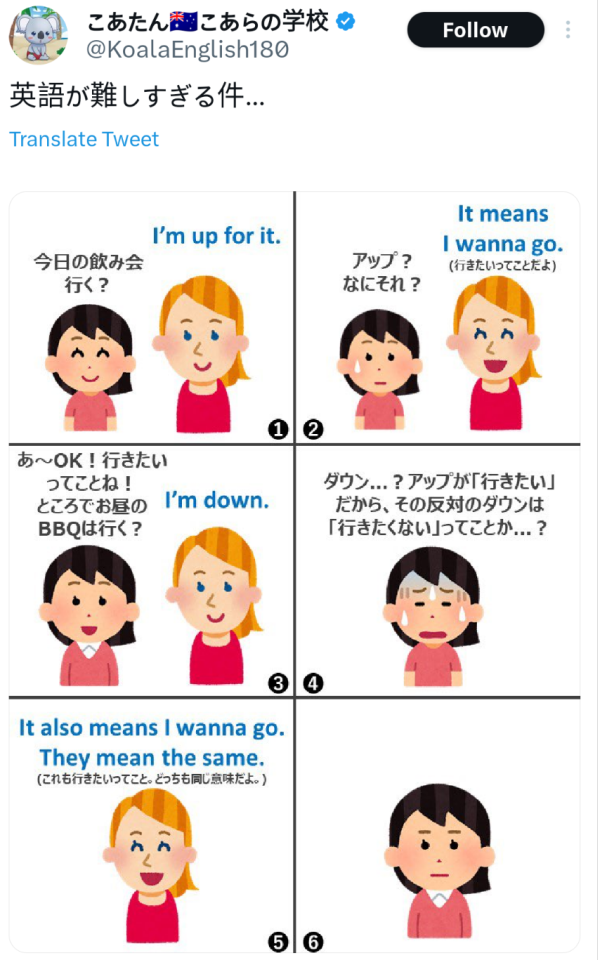
#japanese#learning japanese#japanese vocab#langblog#japan#anime#tumblr language#langblr#manga#japanese vocabulary
20K notes
·
View notes
Text
In my L1-acquisition class two weeks ago, our professor talked about how only 9% of the speech a baby hears is single words. Everything else is phrases and sentences, onslaughts of words and meaning!
Thus, a baby not only has to learn words and their meanings but also learn to segment lots of sounds INTO words. Doyouwantalittlemoresoupyesyoudoyoucutie. Damn.
When she talked about HOW babies learn to segment words our professor said, and I love it, "babies are little statisticians" because when listening to all the sounds, they start understanding what sound is likely to come after another vs which is not.
After discussing lots of experiments done with babies, our professor added something that I already knew somewhere in my brain but didn't know I know: All this knowledge is helpful when learning an L2 as well:
Listen to natives speaking their language. Original speed. Whatever speaker. Whatever topic.
It is NOT about understanding meaning. It is about learning the rhythm of the language, getting a feeling for its sound, the combination of sounds, the melody and the pronunciation.
Just how babies have to learn to identify single words within waves of sounds, so do adults learning a language. It will help immensely with later (more intentional) listening because you're already used to the sound, can already get into the groove of the languge.
Be as brave as a baby.
You don't even have to pay special attention. Just bathe in the sound of your target language. You'll soak it up without even noticing.
#this is not “learn a language while you sleep”#but it is similarly easy#german#langblr#deutsch#learning german#language learning#deutsch lernen#german language#german learning#german vocabulary#language
10K notes
·
View notes
Text
call me crazy but there is a difference between treating your adult players like they are new to the world and treating your adult players like they have the memory of a goldfish and the vocabulary of a 9 year old
#the new players excuse is always going to be a cop out to me#new players can use the codex#or the fucking wiki#inquisition had tons of new players too#it wasnt written like that#its a deflection#also i had to change the age i put from 11 to 9 because i remembered#that i taught 6th grade language arts#and we did vocabulary#and 11 year olds have a bigger vocabulary than what veilguard uses in 99% of its writing#veilguard critical#they act like dragon age is special in its lore depth and complexity and plot#and that they had no choice but to over-explain because the plot is just SOOOOOO complex#when its not unique#every fantasy video game is like this#people enjoy exploring new worlds#meanwhile bg3 throws you into the forgotten realms lore and says learn to swim or die bitch!
546 notes
·
View notes
Text
Here's the long-promised Latin resources masterpost! Resource recs are always appreciated and I'll try to update this post from time to time. :)
Study and fluency tips, plus my review of a few different Latin textbooks here
Free online resources here
Suggestions for if you've studied Latin in the past and want to brush up/re-learn here
Tips for expanding vocabulary here
Links for Latin literature and suggestions on which works to start with here
Salvete!
836 notes
·
View notes
Text
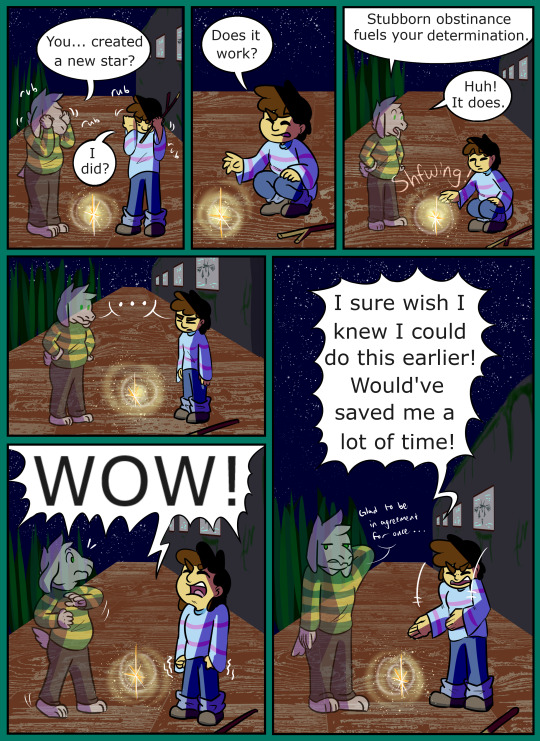
Page 341
(Links coming in afternoon reblog!)
#undertale#undertale comic#undertale au#utau#ghost switch#gs comic#my art#frisk#asriel#fun little ghost switch factoid time:#asriel has picked up a few vocabulary words from chara but doesn't always know how to use them right#case and point- he's basically saying 'stubborn stubbornness' in the second panel#(pedantic was another word he picked up from chara which was used the page prior)#(and I like to think he learned the word despondent from them too which is used in-game during the no mercy route)
182 notes
·
View notes
Text
Today I learned about the following Japanese words
晴れ女 (はれおんな), a woman who causes the weather to become sunny when she goes out
晴れ男 (はれおとこ), a man who causes the weather to become sunny when he goes out
雨女 (あめおんな), a woman whose presence causes rain
雨男 (あめおとこ), a man whose presence causes rain
I decided to create a fifth one:
天気の友 (てんきのとも), your nonbinary friend who is always prepared for whatever weather they might face. Rain coat, mittens, zip-off pants, you name it. They're prepared.
For illustrative purposes:
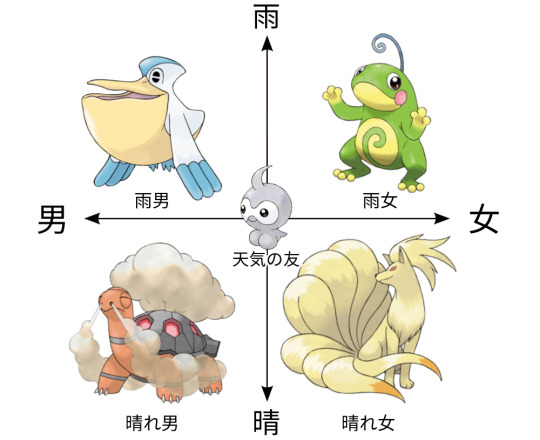
#meme#japanese language#pokemon#pokemon meme#politoed#ninetales#castform#torkoal#pelipper#learn japanese#language learning#japanese vocabulary#ポケモン
604 notes
·
View notes
Text
hey since ASAB terms are sort of becoming the next "biological (fe)male". reminder that ASAB terms simply describe what was observed and assigned by someone else when you were born. It is/was your Legal Sex. not everyone who was AMAB is a "biological male". or vice versa.
use more terms that don't exclude people! say perisex/dyadic! there's even alternative single-word terms that mean "biological (fe)male!": say müllerian! say wolffian!
expand your queer vocabulary to better describe various experiences!!! synonyms exist for a reason!! just start Looking Shit Up I promise it's so much fun! I love learning!!!!!!
#obligatory We Are Not Intersex for this post#well. as far as we're aware anyway#we just recently learned müllerian and wolffian exist#and I think I would like to include intersex folks more in my vocabulary#also because those words scratch my brain /pos#intersex#queer#transgender#lgbtqia#lgbtq#mild take? maybe?
1K notes
·
View notes
Text
接続詞(せつぞくし)
conjunctions - words that are used to link phrases together
情報を加える // Adding information:
しかも besides そのうえ moreover, on top of that さらに moreover, on top of that そればかりか not only that, but also... そればかりでなく not only that, but also...
情報を対比する // Putting into contrast:
それに対して in contrast 一方 whereas
他の可能性・選択肢を言う // Giving alternatives:
あるいは or perhaps (presenting another possibility) それとも or (presenting another option within a question)
結論を出す// Drawing a conclusion:
そのため for that reason したがって therefore そこで for that reason (I went ahead and did...) すると thereupon (having done that triggered sth. to happen) このように with this (adjusting a conclusion to the arguments given beforehand) こうして in this way
理由を言う // Giving a reason:
なぜなら...からだ the reason is というのは...からだ the reason is
逆説を表現する // Expressing a contradiction:
だが however, yet, nevertheless (contradicting what one would have expected) ところが even so (spilling a surprising truth) それなのに despite this, still それでも but still (despite a certain fact, nothing changes)
説明を補う // Amending one's explanation:
つまり that is, in other words (saying the same thing using different words) いわば so to speak (making a comparison) 要するに to sum up, in short
説明を修正する // Revising one's explanation:
ただし however (adding an exception to the information stated beforehand) ただ only, however もっとも however (obviating any expectations that might arise through the previous statement) なお in addition, note that (adding supplementary information)
話題を変える // Changing the subject:
さて well, now, then (common in business letters after the introductory sentence; is often ignored in tranlations) ところで by the way
#文法#grammar#conjunctions#japanese grammar#jlpt n2#japanese langblr#japanese language#language#japan#japanese#japanese vocabulary#langblr#linguistics#studyblr#study blog#studyspo#study motivation#study aesthetic#study notes#learning japanese#nihongo#日本語#日本語の勉強#light academia#light acadamia aesthetic
972 notes
·
View notes
Text
ancient greek words for colors:
On the whole, the Greeks were not really concerned with giving names to specific colors. Their color terms were vague, often had more to do with shade than color difference, and drew in a sort of dynamic physicality that is honestly incredibly interesting.
μέλας and λευκός, which were commonly used to refer to black and white respectively, were still more involved with shade than the particular colors that we perceive as black and white. μέλας also meant dark, murky, and swarthy. λευκός was light, bright and clear, referred to any white color from a pure white to a light grey, and could also refer to someone with lighter skin.
χλωρός meant pale green or greenish yellow, but also commonly meant pale or pallid when referring to people and fresh or blooming when referring to plants and liquids (including blood and tears).
πορφύρεος is where we get the color term purple. And when it was referring to clothes or things, it did mean purple. But when it was describing people, especially their complexions, it meant bright red or flushed. This definition originates from the basic meaning of the word: heaving, surging, gushing, coming from the verb πορφύρω.
ξανθός and ἐρυθρός are perhaps the only straightforward terms, meaning yellow or golden and red respectively. ξανθός was typically used to describe blonde (ish) people; Achilles is described as having ξανθή κόμη (golden hair).
γλαυκός was commonly used to refer to the color grey, or simply to describe something as gleaming. When it refers to eyes, it usually describes the color; the most famous example being Athena and her epithet of γλαυκῶπις or grey-eyed (or gleaming eyed).
And now let's talk about κυάνεος. We get the color term cyan from it, and the word is popularly considered to refer to a dark blue. But that isn't exactly accurate. If we look at what this word typically described: hair, people, etc., it is clear that the concept of blue that we have nowadays wasn’t really coming into play. In fact, the more general translation is dark or black, conveying a shade rather than a color, like μέλας. If I were to attribute a color term to this word at all, I would probably say blue-black, or a cool black, to convey the depth of that shade, which is probably what the Greeks were describing.
#ancient greek#vocab#vocabulary#language learning#greek language#greek vocab#classical literature#classics#colors#words for colors#how to describe colors#dys blurbs#i had to make my own list because every other one i've seen has colors that aren't referred to by texts with as much frequency#achilles#athena#the iliad#the odyssey
630 notes
·
View notes
Text
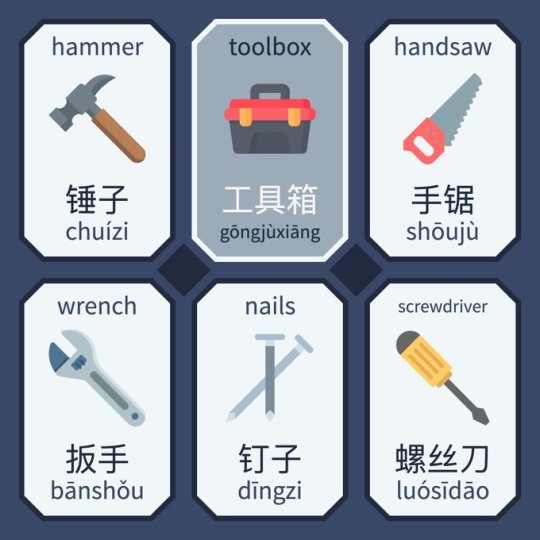
🎓 Learn Chinese Online | Learn Mandarin | Chinese Vocabularies
#learn chinese#mandarin#belajar bahasa mandarin#belajar bahasa mandarin pemula#belajar mandarin#chinese language#education#language learning#learn chinese online#tumblr#tumblr today#today on tumblr#usa today#learning#vocabulary learning#vocabulary#chinese vocabulary
10 notes
·
View notes
Text
[vocabulary] 恋人繋ぎ
恋人繋ぎ・こいびとつなぎ noun = intimately holding hands with interlocked fingers (lit. lovers' interlock)

holding my textbook like a lover
#japanese language#learning japanese#japanese langblr#japanese vocabulary#japanese words#japanese memes#memes#日本語#語彙
95 notes
·
View notes
Text


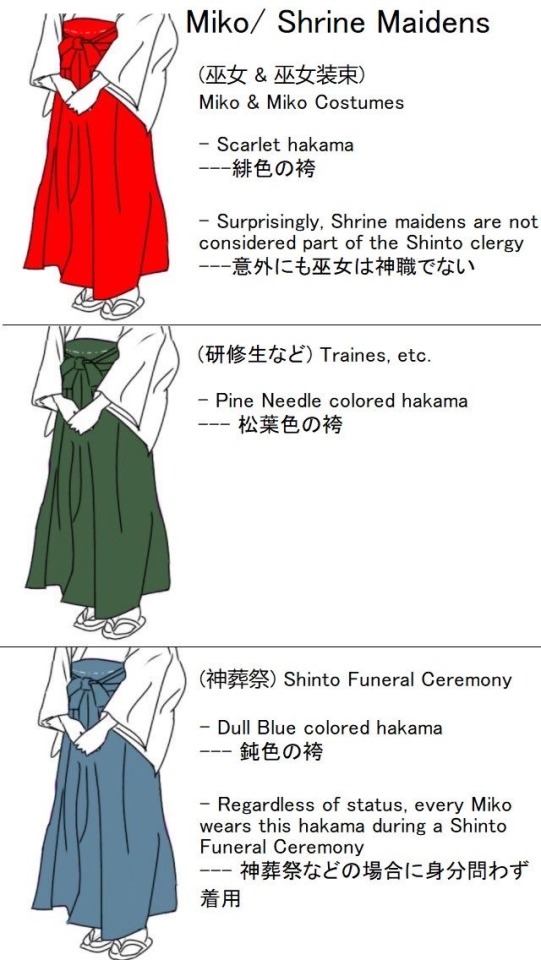
#japanese#learning japanese#langblog#japan#langblr#japanese vocab#anime#manga#tumblr language#japanese vocabulary#shinto#japanese shrine#shrine#kanji practice#kanji#hiragana#japanese fashion#japan travel#japanese language#japan girl#shrine maiden#kyoto#tokyo#nihongo#jjk#inuyasha
961 notes
·
View notes
Text

✨"Sehr geehrte Besucher, aufgrund Ihres hohen Alters ist unsere Leopardin leider gestorben"✨
The marking on the picture around the word "Ihres" points to the importance of proper capitalization of the formal you in German to distinguish it from her/your
ihr = her (feminine singular possessive pronoun) / your (plural personal pronoun; this doesn't make sense here though)
aufgrund ihres hohen Alters -> because of her (the female leopards) old age
Ihr = you (formal)
aufgrund Ihres hohen Alters -> because of your (the readers)visitors) old age
Dear visitor, due to her old age, the female leopard has unfortunately passed away.
vs.
Dear visitor, due to your old age, the female leopard has unfortunately passed away.
#german#langblr#deutsch#language learning#learning german#deutsch lernen#german language#german learning#language#german vocabulary
1K notes
·
View notes
Text
sewing vocab list | français - english
verbes
coudre - to sew
couper - to cut
enfiler - to thread
froncer - to gather
installer - to install
marquer - to mark
ourler; faire un ourlet - to hem
repasser - to iron
s'effilocher - to fray
épingler - to pin
adjectives
cousu main - hand-stitched
tissé - woven
noms (fem/masc)
la laine - wool
la manche/la manchette - cuff
une aiguille - needle
une machine à coudre
une paillette - sequin
une pince - dart
une ruche - ruffle
une épingle - pin
le coton - cotton
le tissu - fabric
le tricot - knit fabric
le tulle - tulle
un bouton - button
un fil - thread
un mannequin - mannequin
un modèle - pattern
un mètre ruban - measuring tape
un vêtement - garment
si quelqu'un a les autres mots pour recommender ou des corrections, mets-ils en les comments/tags ou dm moi ^.^
(aussi si vous avez quelques autres thèmes pour une liste, je vais essayer les faire :3)
#frenchblr#french learning#learning french#french notes#french vocab#language learning#french studyblr#french langblr#coudre#vocabulary#vocab list#vocabulaire
236 notes
·
View notes